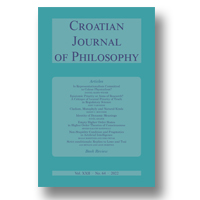|
articles |
|
1.
|
Croatian Journal of Philosophy:
Volume >
9 >
Issue: 3
John Collins
The Perils of Content
abstract |
view |
rights & permissions
| cited by
A range of positions persist in the proper interpretation of generative linguistics. The paper responds to recent work in this area that either weakly or strongly diverges from the non-contentful, internalist model presented in Collins (2008a). Against the sympathetic criticisms of Matthews (2008) and Smith (2008), it is argued that a crucial role for content in our understanding of linguistic theories remains obscure, although the discussion here will hopefully clarify the divergence between the parties as merely perspectival. Rey (2008) more strongly argues that the non-contentful model is prey to some classic complaints. The charges are rebutted. Finally, the position of Devitt (2008a, b) is considered. It is argued that his most recent presentation of his brand of realism fails to speak to the fundamental complaints levelled against it, especially as regards the putative role of conventions in the explanation of unvoiced syntax.
|
|
|
|
|
2.
|
Croatian Journal of Philosophy:
Volume >
9 >
Issue: 3
Fritz J. McDonald
Linguistics, Psychology, and the Ontology of Language
abstract |
view |
rights & permissions
| cited by
Noam Chomsky’s well-known claim that linguistics is a “branch of cognitive psychology” has generated a great deal of dissent—not from linguists or psychologists, but from philosophers. Jerrold Katz, Scott Soames, Michael Devitt, and Kim Sterelny have presented a number of arguments, intended to show that this Chomskian hypothesis is incorrect. On both sides of this debate, two distinct issues are often conflated: (1) the ontological status of language and (2) the relation between psychology and linguistics. The ontological issue is, I will argue, not the relevant issue in the debate. Even if this Chomskian position on the ontology of language is false, linguistics may still be a subfield of psychology if the relevant methods in linguistic theory construction are psychological. Two options are open to the philosopher who denies Chomskian conceptualism: linguistic nominalism or linguistic platonism. The former position holds that syntactic, semantic, and phonological properties are primarily properties, not of mental representations, but rather of public languagesentence tokens; The latter position holds that the linguistic properties are properties of public language sentence types. I will argue that both of these positions are compatible with Chomsky’s claim that linguistics is a branch of psychology, and the arguments that have been given for nominalism and platonism do not establish that linguistics and psychology are distinct disciplines.
|
|
|
|
|
3.
|
Croatian Journal of Philosophy:
Volume >
9 >
Issue: 3
Glen Hoffmann
Nativism:
In Defense of the Representational Interpretation
abstract |
view |
rights & permissions
| cited by
The nativist view of language holds that the principal foundation of linguistic competence is an innate faculty of linguistic cognition. In this paper, close scrutiny is given to nativism’s fundamental commitments in the area of metaphysics. In the course of this exploration it is argued that any minimally defensible variety of nativism is, for better or worse, committed to two theses: linguistic competence is grounded in a faculty of linguistic cognition that is (i) embodied and (ii) whose operating rules are represented in the neurophysiology of human language users.
|
|
|
|
|
book discussion |
|
4.
|
Croatian Journal of Philosophy:
Volume >
9 >
Issue: 3
Elvio Baccarini
Medical Ethics, Ordinary Concepts and Ordinary Lives
abstract |
view |
rights & permissions
| cited by
Two issues in Cowley’s book Medical Ethics, Ordinary Concepts and Ordinary Lives are discussed. The first is methodological and it concerns the relation between the personal and the impersonal perspectives. An apparent problem is represented by some uncertainties in the interpretation of their relation in Cowley’s proposal. In some cases presented by Cowley, although the agents do not give up the requirements of the personal perspective, their actions correspond to the requirements of the impersonal perspective. The question is how did the agent make the decision? The other issue is that the personal perspective, as described in some cases, seems to be concerned only by reasons relevant to the subject herself. The question is whether such a perspective may be properly called moral, or it rather deserves to be qualified as prudential, egocentric or egoistic.The second issue regards organ donation, where Cowley contrasts the cultural discourse endorsed by people personally involved because of their links to the dead person, and the bioethicists’ discourse. Some empirical data seem to challenge this distinction.
|
|
|
|
|
book reviews |
|
5.
|
Croatian Journal of Philosophy:
Volume >
9 >
Issue: 3
Iris Vidmar
Justification Without Awareness
view |
rights & permissions
| cited by
|
|
|
|
|
6.
|
Croatian Journal of Philosophy:
Volume >
9 >
Issue: 3
Samo Bohak
Politics as a Moral Problem
view |
rights & permissions
| cited by
|
|
|
|
|
7.
|
Croatian Journal of Philosophy:
Volume >
9 >
Issue: 3
Nenad Miščević
Content and Justification:
Philosophical Papers
view |
rights & permissions
| cited by
|
|
|
|
